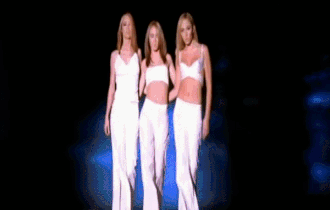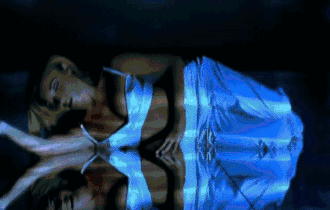Released: 23rd July 2001
Writers: Billy Steinberg / Tom Kelly / Susanna Hoffs
Peak position: #1
Chart run: 1-1-2-6-9-12-21-29-40-45-47-45-34-47-X-X-X-X-X-X-X-X-71
Eternal Flame is one of those songs that didn’t really need to be covered, given the enduring popularity of the original. However, that wasn’t going to stop Atomic Kitten from giving it a good go, regardless.

After coming back from the brink and scoring a massive hit with Whole Again – which remains among the biggest selling girl group hits of all time in the UK – Atomic Kitten found themselves at a juncture. They were five singles deep into their debut album campaign, so, in most circumstances, the temptation would probably have been to move on swiftly. Particularly since Right Now had peaked at #39 and amassed a total of four weeks in the top 75. However, with Jenny Frost being drafted in as a replacement for Kerry Katona shortly before the release of Whole Again, even if anything had been prepared for a second album, it would now need to be re-recorded. So, the decision was instead taken to keep the momentum going with a sixth(!) single and an updated Right Now that featured Jenny Frost’s vocals on half the songs.

Very few pop acts from the late ‘90s/early ‘00s hadn’t indulged in a well-timed cover version or two, so Atomic Kitten could hardly be denounced for recording Eternal Flame. However, the difference here is they resolutely did not need to release a cover at this point. Whole Again was a hit of the magnitude that whatever followed it was unlikely to flop. And even the turnaround between singles (six months, in this case) wasn’t short enough to justify it, given a smattering of new songs were included among those that Atomic Kitten had found time to (re)record. Essentially, You Are could – and should – have concluded the campaign; however, Eternal Flame represented the safe option.

The track was inevitably going to have its critics as a reasonably well-remembered #1 hit in the UK and America for the Bangles in 1989. At the time, it was divisive due to the departure from their signature sound. Indeed, many would argue that the group had other singles far more deserving of being their only chart-topper in the UK. Nonetheless, it’s easy to see why Eternal Flame was so successful, given the inherently relatable quality of the songwriting and a fragile, exposed vocal from Susanna Hoffs. In ticking all the boxes of an ‘80s power ballad, its popularity might have been contentious but certainly wasn’t a mystery. And the same is also true of Atomic Kitten’s version, which maintains much of the same appeal.

The most objectionable aspect of this single is not that it exists but that it commits a cardinal pop music sin. Eternal Flame preceded the re-release of Right Now by several weeks, yet the mix included on some early pressings of the UK album (and all international editions) is entirely different. There’s no apparent reason why this should be the case, so it came across as a bit of an inexcusable cash-grab where the only likely outcome is frustration from Atomic Kitten’s newly buoyant fanbase that they were being sold an out-of-date product (this has since been amended on streaming platforms). Ironically, the album version is arguably the better – or at least less disagreeable – of the two because it sticks much closer to the original as a genuinely rousing, lighters-in-the-air ballad that showcases Natasha Hamilton as a terrific singer; and perhaps that was the concern. The dynamic within Atomic Kitten was not supposed to be one lead vocalist and the rest of the group confined to the background. Indeed, that same situation had emerged within the Bangles and ultimately led to an acrimonious split shortly after Eternal Flame.

Thus, the track was reconfigured to give each member a lead vocal. But, perhaps more importantly – from a record label perspective – it also introduced a mid-tempo backing track that was intentionally similar to Whole Again. For that is precisely what Innocent wanted. Their modus operandi was to unrelentingly fashion material in this style, and they took it to such an extreme that Andy McCluskey and Stuart Kershaw – who’d founded the group and been responsible for much of their early material – refused to continue working on the second album due to the insistence on them regurgitating that same formula repeatedly. Eternal Flame is, therefore, a means to an end in establishing the direction of things to come, and the potential to enjoy it depends entirely on accepting that as the main aim here.

The toe-tapping R&B-lite beat isn’t the only new addition here. For no reason in particular, the song now opens with a soon-to-be-trademark spoken Jenny Frost intro: “Call my name, call my name (call my name) call my name (call my name)”, which is reprised later on. It’s not something the original ever seemed like it needed, but in terms of what Atomic Kitten do with the track, works rather well. Similarly, there’s little of the raw vulnerability Susanna Hoff delivered. In its place is an earnestness that makes even the more melancholic moments: “Say my name, sun shines through the rain, a whole life so lonely, you come and ease the pain…” rather chirpy. The rambunctiousness of Atomic Kitten’s early singles is a distant memory, but they still come across as immensely likeable.

Moreover, Eternal Flame offers a chance to get a sense of the group’s voices and how the new line-up functions. Natasha Hamilton is still front and centre – the huskiness in her tone brimming with charisma – while sweetness and warmth emanate from Liz McClarnon. Although Jenny Frost is tactically steered away from any of the big notes, her presence underlines a newfound maturity to Atomic Kitten. Everything about them is now convincingly pitched towards a slightly older demographic than that which they launched to.

Billy Steinberg – who co-wrote Eternal Flame – has always maintained that the song wasn’t intended to have a conventional chorus. Instead, it has a refrain: “Or am I only dreaming, is this burning an eternal flame” that repeats throughout. However, when the opening verse is repeated at the end, the additional harmonies and ad-libs create a rousing finale that ostensibly became regarded as the chorus. And Atomic Kitten’s rendition repeats the same trick: “Close your eyes, give me your hand (ooh yeah yeah) darling, do you feel my heart beating, do you understand, do you feel the same, or am I only dreaming (dre-e-eaming), or is this burning, an eternal FLA-A-A-AME”, proving itself equally effective as a triumphant victory lap to punctuate this era of the group’s career.

That also applies to the music video, which – while not terribly exciting, admittedly – makes a resounding statement about the new status quo for Atomic Kitten. Dressed head to toe in white, there are slow-motion shots of them walking side-by-side (in perfect unison) aplenty. The set consists of a reflective stage, some lighting rigs and utilises a cool blue-purple colour palette to cast dramatic shadows across the group as they perform to the camera. It’s hard to imagine the budget came close to their first few singles. Still, there’s a sleek, polished quality that presents Atomic Kitten‘s new line-up as a cohesive unit of demure women rather than boisterous teenagers (the video even resists the temptation to display a CGI flame behind the silhouetted shots peppered throughout). That was the takeaway message, and it succeeds in every respect.

Whatever criticisms were aimed at Eternal Flame, the track more than justified its existence, selling 141,994 copies to debut at #1. That’s higher than any weekly sale achieved by Whole Again; and finishing ahead of Bootylicious by Destiny’s Child felt symbolic of just how big Atomic Kitten were by this point (though they had the advantage of this being a brand new single, as opposed to Destiny’s Child whose Survivor album had spent the best part of three months in the top ten, including four weeks at #1). Eternal Flame sold 446,000 copies and remains the group’s third biggest hit overall. It also reached the top 20 throughout Europe, where they’d had a minimal presence before Whole Again. Right Now also topped the UK chart a fortnight later following its re-release. This capped a remarkable turnaround for Atomic Kitten and deftly proved it to be no fluke. There were plans to release You Are as the final single from the album, but conflicting promotional commitments meant a decision was made to preserve the group’s success until they were ready to launch their second album.

In the end, Eternal Flame sits about right within Atomic Kitten’s back catalogue. On paper, it’s one of their bigger hits, which doesn’t feel undeserved or even unsurprising given it was coming off the back of a million-seller. Yet, the song faded into the background somewhat – perhaps because the Bangles’ was always going to be the definitive version – and didn’t define Atomic Kitten’s career (for better or for worse) in the way some covers do.



